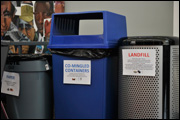Composting, recycling, and local food make GA greener
Charlotte Convention Center added green services, while some hotels lagged behind.
Just like compost itself, GA this year was a mixed bag, said Shawna McKinley, director of sustainability for MeetGreen, the company the Unitarian Universalist Association has hired for the past several years to help make our annual gathering of congregational leaders as environmentally friendly as it can be. GA 2011 was held June 22-26 at the Charlotte, N.C., Convention Center.
First the not-so-good news. “We had a lot of challenges with the hotels in Charlotte,” said McKinley. “The hotels had a lot of basic practices in place, but they had not trained their staff to let people know how to reduce their impact—how and where to recycle, how to reuse linens. The level of green services was less than what the hotels in Minneapolis and Salt Lake City [the two previous GA sites] provided.”
For example, while some hotels in Minneapolis had in-room recycling bins, guests in Charlotte were required to take recyclables to the lobby in many hotels. The Westin Charlotte did offer $5 off on food purchased in the hotel for every day housekeeping services were declined.
There are two sides to that particular initiative, McKinley noted. “While it does permit guests to use towels and linens longer, housekeepers are concerned about their jobs. There could be less need for them. And they make an argument that rooms are harder to clean if guests wait until the end of the week.”
At the convention center, there was nothing but good news this year. “We had heard the center would be tough, with no composting, and food vendors still using polystyrene,” said McKinley. “But the staff team at the convention center really came to the table and they did some things that were quite miraculous.”
She noted the concessions in the convention center switched from “some really bad stuff” to compostable take-out containers and flatware. The food providers in the exhibit hall, where many GA-goers had lunch, used real china and silver flatware rather than paper and plastic.
Asked to provide locally grown food, the convention center found a local farmers cooperative, Farmers Fresh Market.org. “Ours was the largest single order they had ever filled,” said McKinley.
The convention center had a recycling program in place prior to GA and significantly improved it for GA, including adding food composting. McKinley said the center typically diverts about 12 percent of its waste from landfills. “We set a goal of 50 percent for GA, and we think we’re going to exceed that.” More than 3,900 pounds of food compost will be used by landscapers to amend soil. “That’s double what we did at Minneapolis,” she said. “We did exceptional composting at Charlotte. As a result, the staff at the convention center was shocked at how little landfill waste they had. It really opened their eyes. And it was financially neutral. The cost of diverting materials was balanced by a lower landfill cost.”
She added, “We had a really positive experience with the convention center. We empowered them to create their own plan. It wasn’t us telling them what to do. We had an email back from them thanking us for helping them improve. They said they planned to make those changes permanent.”
She also applauded the many UU volunteers who helped people recycle and compost. “It’s so great to work with a group of people who are so open to this rather than being frustrated about having to do it. The volunteers who staffed our recycling stations also learned things that they take back home to their congregations.”
The UUA’s General Assembly and Conference Services staff group has been working since GA 2005 in Fort Worth to make GA greener. “It took us several years to be able to accurately measure what we were doing and to get convention centers on board,” said McKinley. “Since 2008 we’ve not only gotten better at recycling, but organizers are doing a great job of reducing. We are now disposing of one-quarter of what we used to.”
Jan Sneegas, director of the General Assembly and Conference Services staff group, said MeetGreen gets much of the credit for a greener GA. “It guides us toward what we should be asking for.” She confirmed McKinley’s assessment of the hotels this year. “The hotels were a struggle and the convention center was great. It was a very mixed kind of a year.”
She noted that GA 2012, to be held in Phoenix next June, will have its own challenges. “A big one is whether we can get locally sourced food. It will be interesting to see how we can do that in a desert.”
See sidebar for links to related resources.
Comments powered by Disqus







